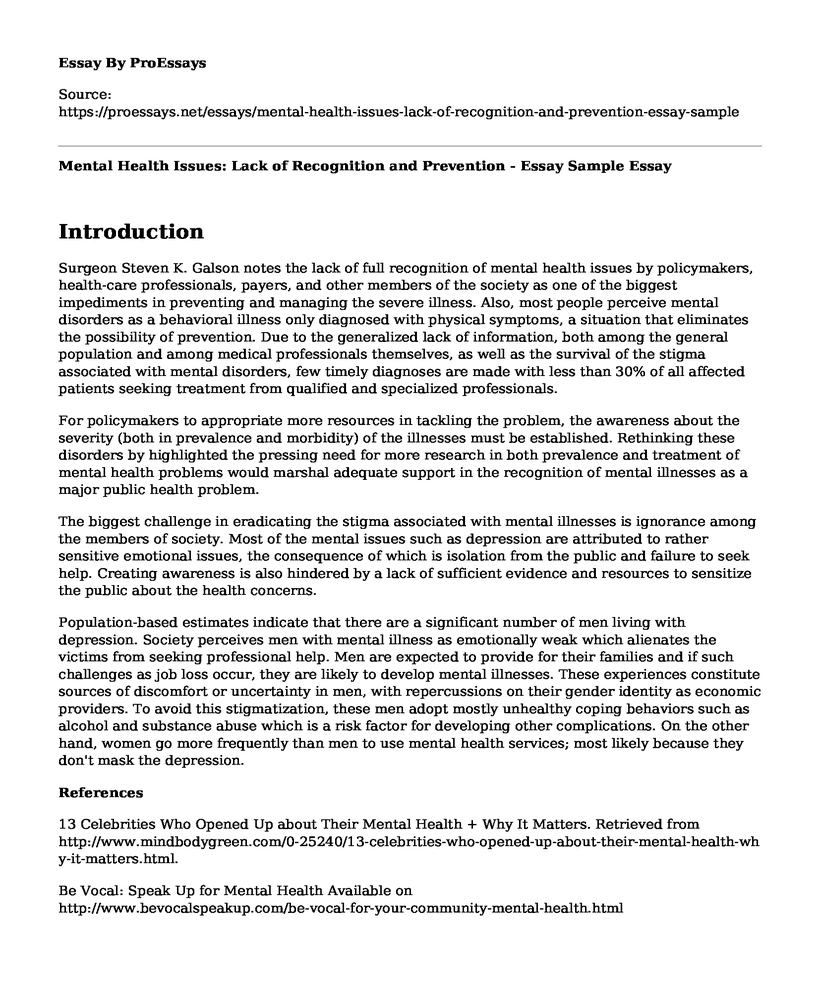Introduction
Surgeon Steven K. Galson notes the lack of full recognition of mental health issues by policymakers, health-care professionals, payers, and other members of the society as one of the biggest impediments in preventing and managing the severe illness. Also, most people perceive mental disorders as a behavioral illness only diagnosed with physical symptoms, a situation that eliminates the possibility of prevention. Due to the generalized lack of information, both among the general population and among medical professionals themselves, as well as the survival of the stigma associated with mental disorders, few timely diagnoses are made with less than 30% of all affected patients seeking treatment from qualified and specialized professionals.
For policymakers to appropriate more resources in tackling the problem, the awareness about the severity (both in prevalence and morbidity) of the illnesses must be established. Rethinking these disorders by highlighted the pressing need for more research in both prevalence and treatment of mental health problems would marshal adequate support in the recognition of mental illnesses as a major public health problem.
The biggest challenge in eradicating the stigma associated with mental illnesses is ignorance among the members of society. Most of the mental issues such as depression are attributed to rather sensitive emotional issues, the consequence of which is isolation from the public and failure to seek help. Creating awareness is also hindered by a lack of sufficient evidence and resources to sensitize the public about the health concerns.
Population-based estimates indicate that there are a significant number of men living with depression. Society perceives men with mental illness as emotionally weak which alienates the victims from seeking professional help. Men are expected to provide for their families and if such challenges as job loss occur, they are likely to develop mental illnesses. These experiences constitute sources of discomfort or uncertainty in men, with repercussions on their gender identity as economic providers. To avoid this stigmatization, these men adopt mostly unhealthy coping behaviors such as alcohol and substance abuse which is a risk factor for developing other complications. On the other hand, women go more frequently than men to use mental health services; most likely because they don't mask the depression.
References
13 Celebrities Who Opened Up about Their Mental Health + Why It Matters. Retrieved from http://www.mindbodygreen.com/0-25240/13-celebrities-who-opened-up-about-their-mental-health-why-it-matters.html.
Be Vocal: Speak Up for Mental Health Available on http://www.bevocalspeakup.com/be-vocal-for-your-community-mental-health.html
Galson S, K. (2009). Mental Health Matters. Surgeon General's Perspectives
TED Talks: Thomas Insel-Toward a New Understanding of Mental Illness [Video file]. Retrieved from http://tinyurl.com/jyjepc9
Cite this page
Mental Health Issues: Lack of Recognition and Prevention - Essay Sample. (2023, May 04). Retrieved from https://proessays.net/essays/mental-health-issues-lack-of-recognition-and-prevention-essay-sample
If you are the original author of this essay and no longer wish to have it published on the ProEssays website, please click below to request its removal:
- Crime and Mental Illness Essay
- Essay on Relationship between Society and an Individual's Self Understanding
- Essay Sample on Mental Health America (MHA)
- Essay Example on Memoirs: Remembering Past Events and People
- ISTJ: Introverted Thinkers With a Keen Sense of Duty - Essay Sample
- Essay on Suicide Prevention Programs: Raising Awareness & Providing Resources
- Paper Sample on Socrates and Meno Debate Virtue: Is It Teachable?







